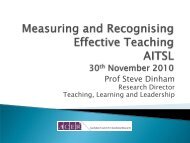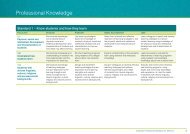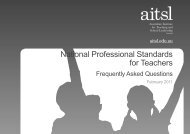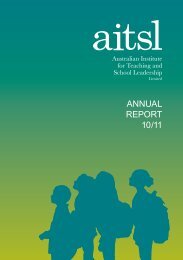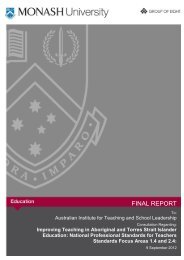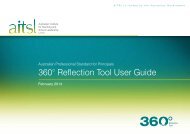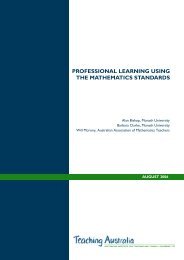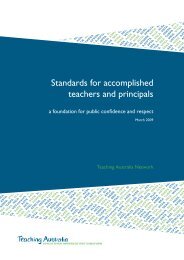Daly, A. J. (2009). Rigid Response in an Age of Accountability. Educational Administration Quarterly,45(2), 168-216.Danielson, C. (2006). Teacher Leadership that Strengthens <strong>Professional</strong> Practice. Alexandria VA:Association for Supervision and <strong>Curriculum</strong> Development.D’Arbon, T., Fasoli, L., Frawley, J., and Ober, R. (2009). Linking Worlds: Strengthening the leadershipcapacity of Indigenous educational leaders in remote education settings. Strathfield NSW: Centre forCreative and Authentic Leadership, Australian Catholic University and Batchelor Institute of IndigenousTertiary Education.Dougherty, C. (2008). The Power of Longitudinal Data: Measuring student academic growth. Austin:Data Quality Campaign/ National Center for Educational Achievement.Davies, B. (2010). Developing a Strategic Leadership Perspective. In B. Davies and M. Brundrett (eds.),Developing Successful Leadership. Studies in Educational Leadership Volume 11. Dordrecht: SpringerScience+Business Media.Dawidowicz, P. (2010). Systems Thinking, Decision Making: What Is Known and What Needs toBe Learned. Paper presented at the 2010 Annual Meeting of the American Educational ResearchAssociation. Denver.Day, C., and Gu, Q. (2007). Variations in the conditions for teachers’ professional learning anddevelopment: sustaining commitment and effectiveness over a career. Oxford Review of Education,33(4), 423 - 443.Dede, C. (2003). A Call to Action for the National Commission on Teaching and America’s Future:Enabling Distributed-<strong>Learning</strong> Communities for Educators Via Emerging Technologies. Washington DC:National Commission on Teaching and America’s Future.Deng, Z. (2007). Knowing the subject matter of a secondary-school science subject. Journal of<strong>Curriculum</strong> Studies, 39(5), 503 - 535.Denning, S. (2010). A leader’s guide to radical management of continuous innovation. Strategy andLeadership, 38(4), 11-16.Department for Education and Skills (2005). <strong>Leading</strong> and coordinating CPD in secondary schools.London: Department of Education and Skills.Doecke, B., Parr, G., North, C., Gale, T., Long, M., Mitchell, J., et al. (2008). National Mapping ofTeacher <strong>Professional</strong> <strong>Learning</strong> Project. Melbourne: Monash University.Dyehouse (2009). A comparison of linear and systems thinking approaches for program evaluation.Evaluation and <strong>Program</strong> Planning, 32(3), 187-196.Elliott, J. (1994). The teacher’s role in curriculum development: An unresolved issue in English attemptsat curriculum reform. <strong>Curriculum</strong> Studies 2(2): 43-69.Ellsworth, J.B. (2000). Surviving change: A survey of educational change models. Syracuse: ERICClearinghouse on Information and Technology. (ED 443 417).Feist, C. (2008). Positions and dispositions: locating leaders within New Zealand secondary schoolfaculties. Journal of Educational Leadership, Policy and Practice, 23(2), 60-73.Fielding, M., Bragg, S., Cunningham, I., Gillinson, S., and Robinson, C. (2005). Factors Influencing theTransfer of Good Practice (No. RR615): University of Sussex and Demos.Fitzgerald, T. (2009).Just leading? Social justice and socially just outcomes. Management in Education,23(4), 155-160.Forsyth, P. (2008). The empirical consequences of school trust. In W. Hoy and M. DiPaola (eds.),Improving schools: Studies in leadership and culture. Charlotte NC: Information Age Publishing.37 <strong>Professional</strong> <strong>Learning</strong> <strong>Flagship</strong> <strong>Program</strong>: <strong>Leading</strong> <strong>Curriculum</strong> <strong>Change</strong>: Literature Review
Frawley, J., Fasoli, L., D’Arbon, T., and Ober, R. (2010). The Linking Worlds Research Project:Identifying intercultural educational leadership capabilities. <strong>Leading</strong> and Managing, 16(1), 1-15.Fullan, M. (2006). <strong>Change</strong> theory: A force for school improvement. Seminar Series Paper No. 157.Melbourne: Centre for Strategic Education.Fulton, K., Doerr, H., and Britton, T. (2010). STEM Teachers in <strong>Professional</strong> <strong>Learning</strong> Communities: AKnowledge Synthesis. Washington DC: National Commission on Teaching and America’s Future.Gabriel, J. (2005). How to Thrive as a Teacher Leader. Alexandria VA: Association for Supervision and<strong>Curriculum</strong> Development.Garet, M., Cronen, M., Kurki, A., Ludwig, M., Jones, W., Uekawa, K., et al. (2008). The Impact of Two<strong>Professional</strong> Development Interventions on Early Reading Instruction and Achievement. WashingtonDC: National Center for Education Evaluation and Regional Assistance, Institute of Education Sciences,U.S. Department of Education.Georgia Leadership Institute for School Improvement (2011). The 8 Roles of School Leaders: DistrictlevelAssessment. District-level Leader Skills to Leverage School Performance. Athens, GA: GeorgiaLeadership Institute for School Improvement.General Teaching Council for England (2006). Using research in your school and your teaching:Research-engaged professional practice. Birmingham: General Teaching Council for England.Giles, C., and Hargreaves, A. (2006). The sustainability of innovative schools as learning organizationsand professional learning communities during standardized reform. Educational AdministrationQuarterly, 42(1), 124-156.Goddard, R., and Miller, R. (2010). The Conceptualization, Measurement, and Effects of SchoolLeadership: Introduction to the Special Issue. The Elementary School Journal, 111(2), 219-225.Goddard, Y., Goddard, R., and Tschannen-Moran, M. (2007). A Theoretical and Empirical Investigationof Teacher Collaboration for School Improvement and Student Achievement in Public ElementarySchools. Teachers College Record, 109(4), 877-896.Goldring, E., Porter, A., Murphy, J., Elliott, S. N., and Cravens, X. (2009). Assessing <strong>Learning</strong>-CenteredLeadership: Connections to Research, <strong>Professional</strong> Standards, and Current Practices. Leadership andPolicy in Schools, 8(1), 1 - 36.Good, T., Clark, S., and Clark, D. (1997). Reform efforts in American schools: Will faddism continue toimpede meaningful change? In Biddle, B., Good, T., and Goodson, I. (eds.) International Handbook ofTeachers and Teaching, pp 1387–1427. Dordrecht: Kluwer.Gorringe, S., and Spillman, D. (2008). Creating Stronger Smarter <strong>Learning</strong> Communities: The roleof Culturally Competent Leadership. Paper presented at the World Indigenous Peoples Conference:Education. Retrieved 15/5/11 fromGraham, P. (2007). Improving Teacher Effectiveness through Structured Collaboration: A Case Study ofa <strong>Professional</strong> <strong>Learning</strong> Community. Research in Middle Level Education, 31(1). Retrieved 16/5/11 fromhttp://www.nmsa.org/Publications/RMLEOnline/Articles/Vol31No1/tabid/1508/Default.aspxGronn, P. (2008). The future of distributed leadership. Journal of Educational Administration, 46(2), 141-158.Gruenert, S. (2005). Correlations of Collaborative School Cultures with Student Achievement. NASSPBulletin, 89(645), 43-55.Gunter, H. (2005). <strong>Leading</strong> Teachers. London: Continuum.Gunter, H. (2006) Educational Leadership and the Challenge of Diversity. Educational ManagementAdministration and Leadership. 34(2), 257-268.<strong>Professional</strong> <strong>Learning</strong> <strong>Flagship</strong> <strong>Program</strong>: <strong>Leading</strong> <strong>Curriculum</strong> <strong>Change</strong>: Literature Review 38
- Page 1 and 2: Professional Learning FlagshipProgr
- Page 3 and 4: ContentsIntroduction ..............
- Page 5 and 6: Curriculum change: Implications for
- Page 7 and 8: Table 1: Overview of factors affect
- Page 9 and 10: This emphasis on capacity-building
- Page 11 and 12: Much of the foregoing discussion is
- Page 13 and 14: Features of successful professional
- Page 16 and 17: p. 1051) conclude that, ‘Findings
- Page 18 and 19: 2007; Gruenert 2005; Printy 2008; S
- Page 20 and 21: RecommendationsProfessional learnin
- Page 22 and 23: impersonal relationships• rationa
- Page 24 and 25: • The organisational goals are di
- Page 26 and 27: Table 2: Two views of teacher leade
- Page 28 and 29: A range of specifications and stand
- Page 30 and 31: In secondary schools, teacher leade
- Page 32 and 33: 1. Stimulus for innovation — Why
- Page 34 and 35: Table 4: Elements and processes of
- Page 36 and 37: The education of Indigenous student
- Page 38 and 39: ReferencesAinscow, M. (2005). Devel
- Page 42 and 43: Hall, R. (1997). Knowledge Use and
- Page 44 and 45: Meirink, J., Meijer, P., Verloop, N
- Page 46 and 47: Thorpe, R., and Gold, J. (2010). Le
- Page 48: aitsl.edu.auFurther informationTele





